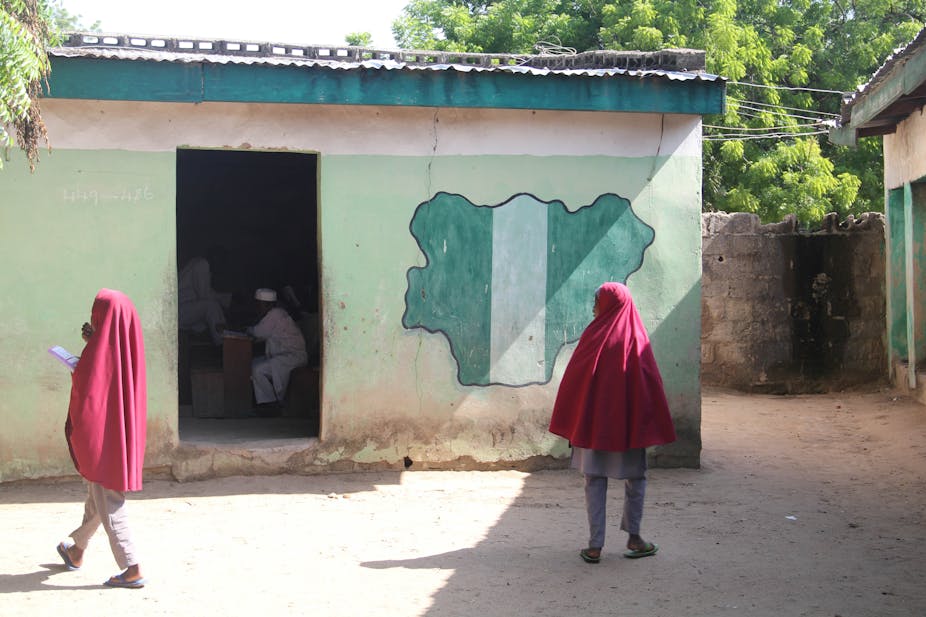Recent reports about the mistreatment of children in Nigeria included news reports of “torture houses” at Islamic schools in a number of states. The catchy news headlines came close to invoking mass hysteria by linking events at the schools to kidnapping, child begging, Boko Haram and Nigeria’s reported 10 million “out of school” children.
In this environment, every Nigerian becomes an expert and has a strong opinion. But the debate doesn’t include the very people involved in the system who struggle to make a claim for alternative narratives.
I have conducted research into this system of Qur'anic education for the past six years. I have looked specifically at the mainstream misrepresentation and distortion of Almajiranci, a classical system of Qur'anic schooling which is common in northern Nigeria and other parts of Muslim West Africa. Young boys are sent away from home to live with and study the Qur'an with a teacher, also known as a Malam. “Single-story” narratives about this simplify an otherwise complex and nuanced system of education and socialisation.
In my research, I used the stories of the men who had gone through the system as a counter narrative. I especially aimed to amplify their voices to challenge their harsh representations by Nigerians like myself – the “Western-schooled elite”. People with the power to do all the representing.
The conclusion I have reached is that if Nigerians only adhere to the mainstream discourses of Almajiranci, bent on seeing Qur’anic schools only through a lens of dysfunctionality, they risk never really understanding what this situation tells them about their society. They also risk misunderstanding how society fails its most vulnerable – again and again. Nigerians end up only presenting it as a problem of Almajiranci – a system which Nigerians have already convinced themselves is not fit for purpose, and which they have learnt to encounter (and to judge) only through superior (Western schooled) gazes.
It is important, therefore, not to take the issue of these “torture houses” as only peculiar to Almajiri Qur’anic schools.
My research
In my research, I broke the debates about Almajiranci into three main categories: as a backward and retrograde system of knowledge; as producing dysfunctional adults; and as abusive and posing a children’s rights concern.
To many Nigerians, Almajiranci as an education system is past its sell-by date. It is considered to have no utilitarian value, and no longer fit for the production of the ideal and modern Nigerian citizen. Through this lens, the way that Almajirai learn is not considered as learning. It is no longer deemed as either valued or valid knowledge. After all, Nigerians cannot see how Almajirai can end up as doctors, engineers, lawyers and politicians.
This is in contrast to attitudes towards Western schooling, which has been inherited through the colonial project and which continues to be viewed as being modern and valuable.
Another effect of this way of thinking is a difference in understanding what Almajiranci really means to its many practitioners. Nowhere is this difference more visible than in the way that Qur’anic schools – and the men who function in them – are conceptualised. Many Western schooled Nigerians hold both simultaneously noble and degrading stereotypes of the men that this system produces.
But, in fact, the treatment of former Almajirai, men who have been through the Almajiranci system of education and who identify as Malamai (Qur'anic school teachers) within their local communities, is often quite removed from their treatment and representation in the mainstream media and debates.
Being a Malam
According to Nasir Mohammed Baba, an eminent scholar of Almajiranci, being a Malam can confer leadership responsibilities in the religious and social life of host communities. This includes being expected to undertake traditional roles of healing and spiritual protection. These services are highly sought after and are often delivered discreetly, or even in secrecy.
Services which I call Acts of Malamta can include sanctification of a new home or car, and prayers for success, charisma and the dead. They can also include treatment of addiction, mental health conditions and behavioural problems.
It is this role that’s very important in providing context to the so-called “torture houses”. Nigeria is a society that struggles with several structural and systemic inadequacies and failures. These include a struggling health care system, as well as a raging drug addiction problem.
This is happening in a society without an appropriate understanding and acceptance of mental health issues, and in which mental health facilities are inadequate.
Juxtapose this with a high level of societal shame, and a need to cover up for family honour, and you have a perfect storm.
I believe strongly that it is these conditions that allow torture houses like the ones found in Daura, Kaduna, Ilorin and Ibadan to function. It also speaks to a pressing need, but for which there are very few alternatives. This means many are forced to revert to what is available – even when it is horrific and clearly problematic.
Word of caution
The abuse found in these so-called “Qur'anic schools” is replicated in several other contexts in Nigeria – in homes with people hired as domestic help being whipped for minor misdemeanours. The abuse is also replicated in other religious establishments where people are taken for deliverance, in Nigeria’s prison system where everything goes, and in government boarding schools which can sometimes be brutal. This abuse is seen even in the few government-owned rehabilitation facilities where inmates are shackled.
It would be a mighty shame – and a missed opportunity – if Nigerians didn’t use the opportunity of the horror stories to take a hard look at themselves.

